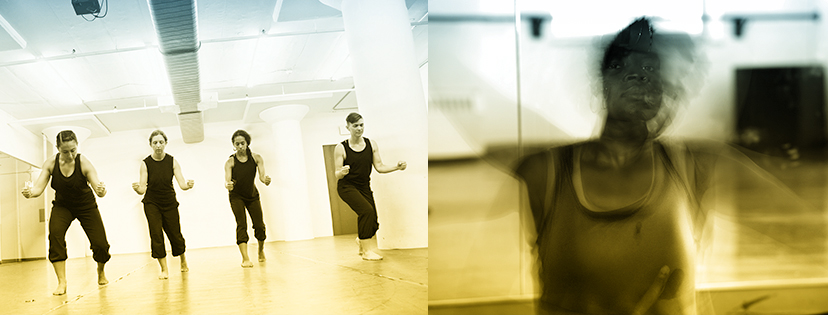CHICAGO — Links Hall’s white space was packed to the gills Sept. 18 for the last of three performances of “Belonging,” as is usually the case in choreographers’ first attempts at a concert. The split bill shared by Nora Sharp and Haydée Souffrant was as full as the audience, with well over an hour of work between them and plenty to chew on.
Nora Sharp has been seen regularly since her arrival on the scene a few years ago, diving head first into curation, program development, and performance despite a late start in dance. A classically trained musician, Sharp’s keen sense of sound and rhythm lay the foundation For Our Purposes, a quartet set to an original score composed by her brother, violinist Sam Sharp, and performed live by an 8-piece ensemble. The rich, beautiful score juxtaposes Sharp’s movement, which for the first third of the piece is mostly just walking. Simple but clever, each pass of walking grows in energy, tugging at the music, not totally conforming to it. It’s a partnership that almost reminds of Copland and Graham – playing between dissonance and resonance, with a keen eye on the details. I appreciated the dichotomies of For Our Purpose‘s beginning more than its end: a sweeping dance phrase that turns into a full-on menage. It is in these moments that Nora Sharp’s novicity peeks through; her dance can’t quite keep up with the score.

Coincidentally, both works on the program are about being in sync, though Souffrant’s is actually called that. Sharp’s quartet seeks to find individuals within unison dancing, while Souffrant seeks unison with herself. Her solo, In Sync, describes prior experiences with sexual trauma and arthralgia (joint pain) though recorded text and mostly literal movements and gestures. She is accompanied onstage by an alter of sorts: candles and books surrounding a full length mirror covered in a sheet until In Sync‘s conclusion. Souffrant rubs her chest and writhes her hands on her thighs, pacing nervously from one end of the room to the other. It’s a painful story, but not one that feels overly cathartic or invites sympathy. In the end, Souffrant appears to win the battle with herself as she uncovers her mirror – and her infectious smile – and sees herself honestly… perhaps for the first time.
